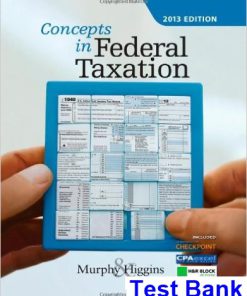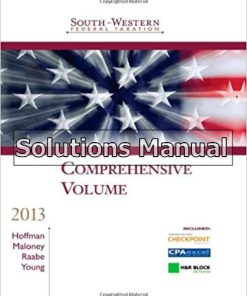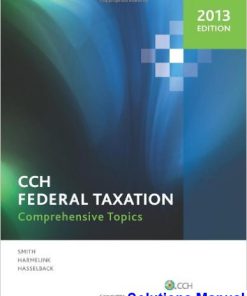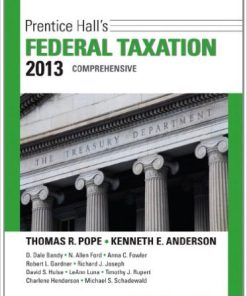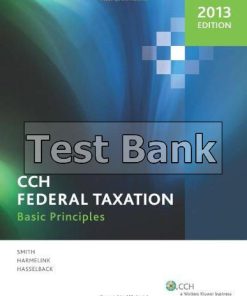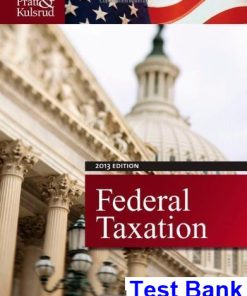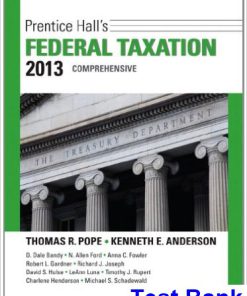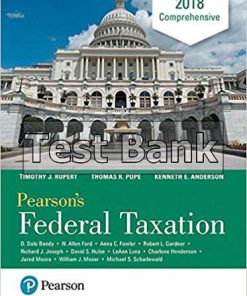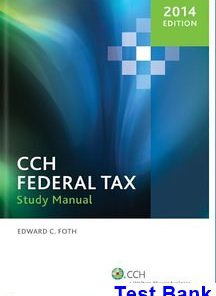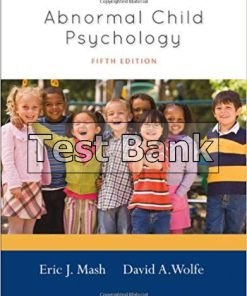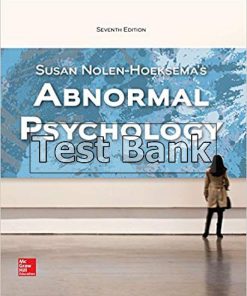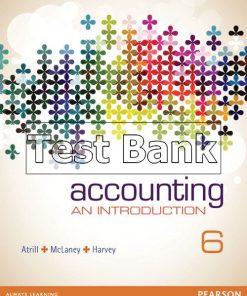CCH Federal Taxation Comprehensive Topics 2013 1st Edition Harmelink Test Bank
$50.00 Original price was: $50.00.$26.50Current price is: $26.50.
CCH Federal Taxation Comprehensive Topics 2013 1st Edition Harmelink Test Bank.
CCH Federal Taxation Comprehensive Topics 2013 1st Edition Harmelink Test Bank
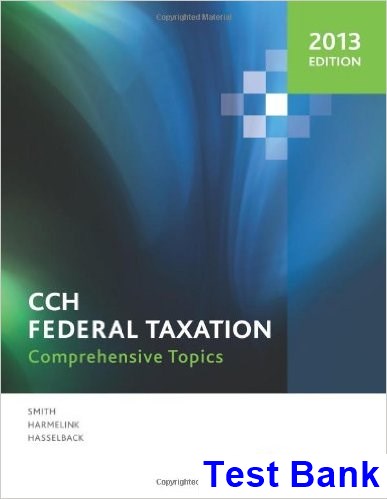
Product details:
- ISBN-10 : 080802972X
- ISBN-13 : 978-0808029724
- Author: Harmelink
CCH’s 2013 Federal Taxation: Comprehensive Topics is a popular teacher-created combination first- and second-level tax course that offers comprehensive one-volume coverage of all the most important tax concepts and principles for a solid grounding in federal taxation. It offers clear and concise explanation of fundamental tax concepts in the framework of today’s tax practice. Covering both planning and compliance, the book strikes an effective balance between AICPA model curriculum demands and the favored approaches of the majority of today’s top tax teachers. CCH’s Comprehensive Topics introduces students to the complex and absorbing study of federal taxation, covering a broad range of subjects beginning with basic concepts and individual taxation. Once the fundamentals are covered, tax accounting and the taxation of partnerships and corporations become the focus. The final section of the book presents estate and gift taxation coverage, along with income taxation of trusts and estates.
Table contents:
- CHAPTER 1: INTRODUCTION TO FEDERAL TAXATION AND UNDERSTANDING THE FEDERAL TAX LAW
- FUNDAMENTAL ASPECTS OF FEDERAL TAXATION
- Sources of Revenue
- Tax Collection and Penalties
- Taxpayer Obligations
- Brief History of the Federal Income Tax
- Federal Tax Legislative Process
- Tax Reform
- UNDERLYING RATIONALE OF THE FEDERAL INCOME TAX
- Objectives of the Tax Law
- Economic Factors
- Social Factors
- Political Factors
- Tax Policy and Reform Measures
- BASIC TAX CONCEPTS
- Essential Tax Terms Defined
- CHAPTER 2: TAX RESEARCH, PRACTICE, AND PROCEDURE
- TAX REFERENCE MATERIALS
- Classification of Materials
- PRIMARY SOURCE MATERIALS
- Statutory Authority
- Administrative Authority
- Judicial Authority
- SECONDARY SOURCE MATERIALS
- Analysis of Tax Law Sources
- RESEARCH METHODOLOGY
- Types of Tax Research Situations
- Research Model
- TAX ADMINISTRATION
- Organization of the IRS
- Representation of Taxpayers
- Rulings Programs
- Taxpayer Compliance Assistance
- TAX PRACTICE AND PROCEDURE
- Examination of Returns
- Appeals Process
- Settlement Agreements
- Refunds
- Interest on Under/Overpayments
- Statute of Limitations
- Penalties
- Disclosure of a Position on a Return
- Ethics Rules for Practitioners
- CHAPTER 3: INDIVIDUAL TAXATION—AN OVERVIEW
- Components of the Tax Formula
- Gross Income
- Deductions for Adjusted Gross Income
- Adjusted Gross Income
- Itemizing v. Standard Deduction
- Tax Rates
- Tax Credits and Prepayments
- Net Tax Due or Refund
- Classification of Taxpayers
- PERSONAL EXEMPTIONS
- Taxpayer and Spouse
- Dependents
- FILING STATUS AND REQUIREMENTS
- Married Individuals Filing Jointly
- Married Individuals Filing Separately
- Single Individuals
- Heads of Households
- Surviving Spouses
- Tax Returns of Dependents
- Filing Requirements
- Tax Tables
- Tax Rate Schedules
- Self-Employment Tax and Medicare Surtaxes
- CHAPTER 4: GROSS INCOME
- THE CONCEPT OF INCOME
- Economic Income
- The Legal/Tax Concept of Income
- Accounting Income
- ECONOMIC BENEFIT, CONSTRUCTIVE RECEIPT, AND ASSIGNMENT OF INCOME DOCTRINES
- Economic Benefit Doctrine
- Constructive Receipt Doctrine
- Assignment of Income Doctrine
- Community Property Income
- Tenancy by the Entirety
- Joint Tenants and Tenants in Common
- ITEMS INCLUDED IN GROSS INCOME
- List of Income Items
- Compensation for Services
- Compensation v. Gift
- Jury Duty Pay
- Prizes and Awards
- Scholarships and Fellowships
- Recovery of Tax Benefit Items
- Gross Income Derived from Business
- Partnerships and S Corporations
- Interest
- Rent and Royalty Income
- Dividend Income
- Divorce and Separation
- Discharge of Debt
- STOCK OPTION PLANS
- Restricted Stock Plans
- Incentive Stock Option (ISO) Plans
- Employee Stock Purchase Plans
- Nonstatutory Stock Option Plans
- CHAPTER 5: GROSS INCOME—EXCLUSIONS
- COMMON EXCLUSIONS FROM GROSS INCOME
- Gifts and Inheritances
- Life Insurance Proceeds
- Sale of Residence
- Retirement Income
- Interest on Government Obligations
- EMPLOYEE BENEFITS
- Fringe Benefits
- Group-Term Life Insurance
- Annuities
- Adoption Expenses
- Compensation for Injuries and Sickness
- Accident and Health Plans
- Qualified Long-Term Care Insurance
- Meals and Lodging
- Cafeteria Plans
- Educational Assistance Plans
- Tuition Reduction Plans
- Dependent Care Assistance Programs
- Military Benefits
- CHAPTER 6: DEDUCTIONS: GENERAL CONCEPTS AND TRADE OR BUSINESS DEDUCTIONS
- CATEGORIES OF ALLOWABLE DEDUCTIONS
- Classification of Tax Deductions
- Deductions “For” vs. “From” AGI
- Deductions “For” AGI
- Deductions “From” AGI—Itemized Deductions
- TRADE OR BUSINESS DEDUCTIONS
- Overview—Code Sec. 162
- General Criteria
- Expense Must Be Incurred in a Trade or Business Activity
- Expense Must Be Ordinary and Necessary
- Expense Must Be Reasonable
- Expense Must Be Paid or Incurred During the Taxable Year
- EXPENSES INCURRED FOR THE PRODUCTION OF INCOME
- Code Sec. 212—Production of Income or Protection of Assets
- Tax Planning and Compliance Expenses
- DEDUCTIONS FOR LOSSES
- Code Sec. 165
- OTHER ALLOWABLE DEDUCTIONS “FOR” AGI
- Start-Up and Organizational Costs
- Business Gifts
- Transportation Expenses
- Travel Expenses
- Student Loan Interest
- Health Insurance and Health Savings Accounts
- LIMITATIONS ON THE DEDUCTIBILITY OF EXPENSES
- Certain Deductions Limited or Disallowed
- Business Interest Expense
- Hobby Expenses and Losses
- Personal Deductions
- Public Policy Restrictions
- Lobbying and Political Contributions
- Meals and Entertainment Expenses
- Expenses and Interest Relating to Tax-Exempt Income
- Related Party Transactions
- Payment of Another Taxpayer’s Obligation
- Capital Expenditures
- BUSINESS DEDUCTIONS RELATED TO CAPITAL EXPENDITURES
- Depreciation of Tangible Property
- Alternative MACRS System
- Depreciation of Real Property
- Code Sec. 179 Election to Expense Certain Depreciable Assets
- Bonus Depreciation
- Depreciation of Automobiles
- Property Converted from Personal to Business Use
- Amortization
- Research and Experimental Expenditures
- Depletion of Natural Resources
- Substantiation of Tax Deductions
- CHAPTER 7: DEDUCTIONS: BUSINESS/INVESTMENT LOSSES AND PASSIVE ACTIVITY LOSSES
- TAX SHELTERS AND AT-RISK RULES
- Tax Shelters
- At-Risk Rules
- PASSIVE ACTIVITY LOSS RULES
- Application of Rules
- Classification of Income
- Disallowance of Passive Losses and Credits
- Suspended Losses
- Disposition of a Passive Activity
- Taxpayers Affected by Passive Losses
- Material Participation
- Identifying an Activity
- Rental Activities
- Rental Real Estate Activities
- Change of Activity Status
- BUSINESS AND INVESTMENT LOSSES
- Business Casualty and Theft Losses
- Net Operating Losses (NOLs)
- Hobby Losses
- Home Office Expenses
- Vacation Home Expenses
- CHAPTER 8: DEDUCTIONS: ITEMIZED DEDUCTIONS
- MEDICAL EXPENSES
- Requirements for the Deduction
- Medical Care Expenses
- Capital Expenditures
- Transportation and Lodging Expenses
- Hospital and Other Institutional Care
- Medicines and Drugs
- Medical Insurance Premiums
- TAXES
- Summary of Deductible Taxes
- Property Taxes
- Income and Sales Taxes
- INTEREST
- Requirements for Deduction
- Personal (Consumer) Interest
- Qualified Education Loan Interest
- Qualified Residence Interest
- Investment Interest
- Trade or Business Interest
- Passive Investment Interest
- Payments for Services
- Prepaid Interest
- CHARITABLE CONTRIBUTIONS
- Qualified Organizations
- Valuation of Charitable Donations
- Limitations on Charitable Contributions
- Filing and Substantiation Requirements
- PERSONAL CASUALTY LOSSES
- Casualty Losses
- Rent and Royalty Expenses
- Wagering Losses
- Unrecovered Investment in Annuity
- Qualified Business Income Deduction
- CHAPTER 9: TAX CREDITS, PREPAYMENTS, AND ALTERNATIVE MINIMUM TAX
- NONREFUNDABLE TAX CREDITS
- Types of Credits
- Household and Dependent Care Credit
- Elderly and Disabled Persons Credit
- American Opportunity Tax and Lifetime Learning Credits
- Child Tax Credit
- Credit for Qualified Retirement Savings
- Adoption Assistance Credit
- Foreign Tax Credit
- General Business Credit
- REFUNDABLE TAX CREDITS
- Withholding of Tax on Wages Credit
- Social Security Tax Refunds Credit
- Earned Income Credit
- Withholding of Tax at Source Credit
- Gasoline and Special Fuels Tax Credit
- Estimated Tax Payments Credit
- ALTERNATIVE MINIMUM TAX
- Imposition of Tax
- Adjustments to Taxable Income
- Tax Preference Items
- Exemption Amount
- Tax Credits
- Carryover of Credit
- Alternative Minimum Tax Planning
- CHAPTER 10: PROPERTY TRANSACTIONS: DETERMINATION OF BASIS AND GAINS AND LOSSES
- FACTORS IN DETERMINING GAIN OR LOSS
- Definition of Realized Gain or Loss
- Amount Realized
- Adjusted Basis
- Holding Period
- Recognition and Nonrecognition of Gain or Loss
- DETERMINATION OF BASIS
- Cost
- Basis Allocation
- Stock Dividends
- Stock Rights
- Fair Market Value
- Property Acquired by Gift
- Property Acquired from Decedent
- Stock Transactions
- Personal-Use Property Conversion
- Related Parties
- Installment Reporting
- CHAPTER 11: PROPERTY TRANSACTIONS: NONRECOGNITION OF GAINS AND LOSSES
- SALE OF A PERSONAL RESIDENCE
- The General Rules
- Principal Residence
- Special Provisions
- Definitions Related to Residence
- LIKE-KIND EXCHANGES
- Definition
- Qualifying Property
- Receipt of Boot
- Giving Boot
- Assumption of Liabilities
- Basis of Acquired Property
- Holding Period
- Three-Party Exchanges
- INVOLUNTARY CONVERSIONS
- Definition of an Involuntary Conversion
- Involuntary Conversion Rules for Property Damaged in Disaster
- Replacement Property—Mandatory Rules
- Replacement Property—Elective Rules
- Severance Damages
- Qualifying Replacement Property
- Condemnation of Real Property—Special Rule
- Time Limit
- Reporting Requirements
- Depreciation Rules
- OTHER TRANSACTIONS INVOLVING NONRECOGNITION
- Corporate and Partnership Exchanges
- Stock-for-Stock Exchanges
- Insurance Contract Exchanges
- U.S. Obligations Exchanges
- Reacquisitions of Real Property
- CHAPTER 12: PROPERTY TRANSACTIONS: TREATMENT OF CAPITAL AND SECTION 1231 ASSETS
- SPECIAL RULES AND LIMITATIONS ON TRANSACTIONS
- Background
- Capital Asset Definition
- SPECIAL SITUATIONS IN CAPITAL v. ORDINARY TREATMENT
- Inventory
- Sale of a Business
- Patents
- Franchises
- Lease Cancellation Payments
- Options
- HOLDING PERIOD
- Computation of Holding Period
- Special Rules for Holding Period
- INDIVIDUAL TAXPAYERS
- Determination of Taxable Income
- Capital Loss Carryovers
- Corporate Taxpayers Distinguished
- SPECIAL PROVISIONS FOR CERTAIN INVESTMENTS
- Nonbusiness Bad Debts
- Worthless Securities
- Small Business Stock
- Gains on Small Business Stock
- Dealers in Securities
- Subdivided Real Estate
- SECTION 1231 ASSETS AND PROCEDURE
- Background
- Definition of Section 1231 Assets
- Computational Procedures
- Personal Casualty and Theft Gains and Losses
- DEPRECIATION RECAPTURE—SECTION 1245
- Purpose of Rules
- Definition of Section 1245 Property
- Computational Procedures
- Depreciation Methods
- ACRS or MACRS Property
- Summary: Section 1245 Recapture
- DEPRECIATION RECAPTURE—SECTION 1250
- Definition of Section 1250 Property
- Purpose of Rules
- Nonresidential Real Property—Pre-1981 Acquisitions
- Nonresidential Real Property—ACRS
- Nonresidential Real Property—MACRS
- Residential Real Property—Pre-1981 Acquisitions
- Residential Real Property—ACRS
- Residential Real Property—MACRS
- Low-Income Housing—Pre-1987 Acquisitions
- Summary: Section 1250 Recapture
- RECAPTURE RULES IN OTHER EVENTS
- Gifts and Inheritances
- Like-Kind Exchanges and Involuntary Conversions
- Charitable Contributions
- Installment Sales
- CHAPTER 13: TAX ACCOUNTING
- TAXABLE INCOME AND TAX LIABILITY FOR VARIOUS ENTITIES
- Recapitulation of Taxable Income and Tax Liability
- ACCOUNTING PERIODS
- The Tax Year
- Election of the Tax Year
- CHANGE OF ACCOUNTING PERIODS
- IRS Permission or Consent
- Exceptions to Permission Requirements
- Short Tax Years
- Accounting Period Tax Planning
- Special Rules—The Tax Year
- ACCOUNTING METHODS
- Overall Methods
- Cash Method
- Limitations on Use of Cash Method
- Special Rules—Cash Method
- Accrual Method
- Accrual Method Tax Planning
- Separate Sources of Income
- Hybrid Methods
- Tangible Property Regulations
- CHANGE OF ACCOUNTING METHODS
- IRS Permission or Consent
- Adjustment—Voluntary/Required Change
- Time and Form of Application
- Accounting Method Tax Planning
- Timeliness
- INVENTORIES
- Use of Inventories
- Valuation of Inventory
- Cost Methods
- Uniform Capitalization Rules
- Lower-of-Cost-or-Market (LCM) Method
- Valuation of Inventory Items
- Dollar-Value LIFO Method
- Simplified Dollar-Value LIFO Method
- Estimates of Inventory Shrinkage
- LONG-TERM CONTRACTS
- Alternative Accounting Methods
- Comparison of the Methods
- Capitalization of Expenses
- Special Rules
- INSTALLMENT SALES
- Use of Installment Method
- Computation of Gain
- Electing Out of Installment Reporting
- Dispositions of Installment Obligations
- Repossessions
- Interest on Deferred Payment Sales
- Advantages and Disadvantages of Installment Method
- CHAPTER 14: TAXATION OF CORPORATIONS—BASIC CONCEPTS
- ENTITY CHOICE
- Specific Entities
- Definition of a Corporation
- ORGANIZATION OF AND TRANSFERS TO A CORPORATION
- Use of Corporate Form
- General Requirements
- Transfers of Property
- Transfers for Stock (Requirement #2)
- Control of the Corporation (Requirement #3)
- Receipt of Boot
- Transfers of Liabilities
- Basis Determination
- Recapture Rules
- Section 351 Transfer or Taxable Exchange
- Reporting Requirements
- CORPORATE CAPITAL STRUCTURE
- Equity in the Capital Structure
- Debt in the Capital Structure
- Section 1244 Stock
- Section 1202 Stock
- DETERMINATION OF CORPORATE TAXABLE INCOME
- General Rules
- Accounting Periods
- Accounting Methods
- Capital Gains and Losses
- Depreciation Recapture
- Net Operating Loss
- Charitable Contributions
- Related Taxpayers—Losses and Expenses
- Organizational Expenditures
- Start-Up Expenditures
- Dividends-Received Deduction
- Executive Compensation
- DETERMINATION OF CORPORATE INCOME TAX LIABILITY
- Computation of Tax Liability
- Corporate Income Tax Rates
- Controlled Groups of Corporations
- Consolidated Returns
- Corporate Tax Returns
- Income Taxes and Financial Accounting
- CHAPTER 15: CORPORATE NONLIQUIDATING DISTRIBUTIONS
- DISTRIBUTIONS WITH RESPECT TO STOCK
- Dividend Distributions
- Earnings and Profits (E&P)
- Cash Distributions
- Property Distributions
- Constructive Distribution
- Stock Distribution
- Stock Rights
- STOCK REDEMPTIONS
- Classifications for Tax Treatment
- Sale or Exchange Treatment
- Constructive Ownership Rules
- Redemptions Not Equivalent to Dividends
- Substantially Disproportionate Redemptions
- Complete Termination of Shareholder’s Interest
- Redemptions in Partial Liquidation
- Redemptions to Pay Death Taxes
- Redeeming Corporation’s Tax Consequences
- Redemptions Through Related Corporations
- Preferred Stock Bailouts
- Distributions by Closely-Held Corporations
- CHAPTER 16: CORPORATE DISTRIBUTIONS IN COMPLETE LIQUIDATIONS
- COMPLETE LIQUIDATIONS
- Reasons for Liquidation
- Liquidation Status Requirements
- Summary of Liquidation Rules
- EFFECT OF COMPLETE LIQUIDATION ON CORPORATIONS
- Gain or Loss Recognition
- Liabilities
- Loss Recognition
- Expenses of Liquidation
- Reporting Requirements
- EFFECT OF COMPLETE LIQUIDATION ON SHAREHOLDERS
- Distributions of Property
- Basis of Property Received in Liquidation
- Distributions of Installment Obligations
- Contingent Liabilities
- Corporate Debts to Shareholders
- Liquidation-Reincorporation
- LIQUIDATION OF SUBSIDIARIES
- Special Rules
- Nonrecognition Rules of Section 332
- Parent’s Indebtedness to Subsidiary
- Insolvent Subsidiary
- Minority Shareholders
- Parent’s Basis for Property
- Nonrecognition Rules of Section 337
- Distributions to Minority Shareholders
- Subsidiary’s Indebtedness to Parent
- STOCK PURCHASES TREATED AS ASSET ACQUISITIONS
- Purpose of Election
- Stock Purchase Requirement
- Requirements for Election
- Old Target Corporation
- Advantages of Election
- New Target Corporation
- Allocation of Basis
- Consequences of No Election
- Special Rule
- CHAPTER 17: CORPORATE REORGANIZATIONS
- TYPES OF CORPORATE REORGANIZATIONS
- Statutory Definitions
- General Requirements
- Type A Reorganizations
- Receipt of Boot
- Character of Recognized Gain
- Type B Reorganizations
- Type C Reorganizations
- Type D Reorganizations
- Gain Recognized in Divisive Transactions
- Type E Reorganizations
- Type F Reorganizations
- Type G Reorganizations
- CONSIDERATIONS FOR NONRECOGNITION TREATMENT
- Reorganization as an Alternative to Liquidation
- Use of Subsidiaries in Reorganizations
- Postreorganization Transfers to Subsidiaries
- CARRYOVER OF TAX ATTRIBUTES
- Introduction
- Attribute Carryover Transactions
- Limitations on Carryovers
- Net Operating Loss Limitation
- Ownership Changes—Annual Limitation
- Earnings and Profits
- JUDICIAL REQUIREMENTS
- Introduction
- Business Purpose
- Continuity of Proprietary Interest
- Continuity of the Business Enterprise
- Step Transactions
- Liquidation and Reincorporation
- Acquisitions Made to Evade or Avoid Income Tax
- CHAPTER 18: ACCUMULATED EARNINGS AND PERSONAL HOLDING COMPANY TAXES
- ACCUMULATED EARNINGS TAX
- Rate and Nature of Tax
- Basis for Liability
- Tax-Avoidance Purpose
- Reasonable Needs of the Business
- Computing the Amount of the Accumulated Earnings Tax
- Accumulated Earnings Credit
- Dividends-Paid Deduction
- PERSONAL HOLDING COMPANY TAX
- Rate and Nature of Tax
- Reason for the Tax
- Personal Holding Company Defined
- Stock Ownership Test
- Personal Holding Company Income Test
- Ordinary Gross Income and Adjusted Ordinary Gross Income
- Personal Holding Company Income
- Real Estate Companies
- Calculating the Amount of the Personal Holding Company Tax
- Dividends-Paid Deduction
- Miscellaneous Tax Consequences of PHC Classification
- CHAPTER 19: PARTNERSHIPS—FORMATION AND OPERATION
- DEFINITION OF A PARTNERSHIP
- Characteristics of a Partnership
- PARTNERSHIP REPORTING
- Partnership Tax Filing
- PARTNERSHIP ACCOUNTING CONCEPTS
- Outside Basis
- Inside Basis
- Partner’s Interest in a Partnership
- FORMATION OF A PARTNERSHIP—CONTRIBUTIONS REQUIRING SPECIAL CONSIDERATION
- Contributions in General
- Transfers of Property with Precontribution Gain/Loss
- Transfers of Accounts Receivable for Partnership Interest
- Transfers of Inventory for Partnership Interest
- Transfers of Capital Loss Property for a Partnership Interest
- Transfers of Depreciable Property for a Partnership Interest
- Personal-Use Property Conversions
- FORMATION OF A PARTNERSHIP—RECOGNITION OF GAIN OR LOSS
- Transfers to an Investment Company Partnership
- Transfer of Services for Partnership Capital Interest
- Transfer of Services for Ascertainable Partnership Income Interest
- Disguised Sales
- Disguised Sales Under the Seven Year Rule
- Contribution of Encumbered Property
- Liabilities Assumed by Partnership
- TAXABLE YEAR OF PARTNER AND PARTNERSHIP
- Partner’s Year of Inclusion
- Taxable Year of the Partnership
- Elections by Partner or Partnership
- Initial Costs of a Partnership
- OPERATION OF THE PARTNERSHIP
- Liability for Tax
- Gross Income of Partner
- Allocation of Items
- PARTNER-PARTNERSHIP TRANSACTIONS
- Indirect Ownership
- Transactions Between Partner and Partnership
- Gain or Loss on Transactions Between Partner and Partnership
- Guaranteed Payments
- DEDUCTIBILITY OF LOSSES
- Loss—Limitations
- TERMINATION OF PARTNERSHIP
- Closing of Taxable Year
- Family Partnerships
- Bona Fide Partnership Relationship
- Allocation of Income
- CHAPTER 20: PARTNERSHIPS—DISTRIBUTIONS, SALES, AND EXCHANGES
- PARTNERSHIP DISTRIBUTIONS
- Introduction
- Current v. Liquidating Distributions
- PARTNERSHIP CURRENT DISTRIBUTIONS
- Current Distributions—Cash
- Current Distributions—Property
- Current Distributions of Cash and Property
- Distribution of Multiple Properties
- The Ordering Rules—Properties from Different Classes
- Allocating Basis Reductions—Multiple Assets from Same Class
- PARTNERSHIP LIQUIDATING DISTRIBUTIONS
- Overview
- Liquidating Distributions—Recognition of Gain or Loss
- Liquidating Distributions—Basis of Property Received
- Liquidating Distributions—Receipt of Multiple Properties
- Allocating a Basis Increase Among Multiple Properties
- EFFECT OF LIABILITIES
- Overview
- Reductions in the Distributee-Partner’s Share of Partnership Debt
- Distributions of Property Encumbered by Liabilities
- DISPROPORTIONATE DISTRIBUTIONS—DISTRIBUTION OF “HOT” ASSETS
- Overview
- Triggering Code Sec. 751(b)
- The Mechanics of Code Sec. 751(b)
- SALE OF A PARTNER’S INTEREST IN THE PARTNERSHIP
- Overview—Sale v. Distribution
- General Consequences
- Exchange of Partnership Interests Outside the Partnership for Property
- Partial Sale of Partnership Interest
- Sale of an Interest in a Partnership with Hot Assets
- PARTNERSHIP BASIS ADJUSTMENTS
- Overview—Basis Adjustments in General
- Code Sec. 743(b) Adjustments—Sale or Transfer of a Partnership Interest
- Transferee Partner’s Elective Special Basis Adjustment
- Code Sec. 734(b)—Adjustments Triggered by Partnership Distributions
- RETIREMENT OR DEATH OF A PARTNER
- Payments for Retired Partner’s Interest
- Determining the Partner’s Interest in Partnership Property
- Income in Respect of a Deceased Partner
- Deceased Partner’s Final Income Tax Return
- CHAPTER 21: S CORPORATIONS
- SELECTING THE SUBCHAPTER S FORM
- Introduction
- Eligibility
- Election
- Contributions to the Corporation
- Tax Year of the Corporation
- S CORPORATION TAXATION
- Introduction
- Tax on Built-In Gains
- Tax on LIFO Recapture
- Tax on Passive Investment Income
- General Business Credit Recapture
- Estimated Tax
- Penalties for Failure to File
- TREATMENT OF INCOME, DEDUCTIONS, AND CREDITS
- Corporate Treatment
- Shareholder Treatment of Income Items
- Accumulated Adjustments Account
- TREATMENT OF CORPORATE DISTRIBUTIONS
- Tax Consequences
- Distributions Without Accumulated Earnings and Profits
- Distributions With Accumulated Earnings and Profits
- Basis Adjustment
- TERMINATION OF ELECTION
- Methods
- Revocation of Election
- Ceasing to Be a Small Business Corporation
- Excessive Passive Investment Income
- Tax Treatment of Terminations
- Inadvertent Terminations
- Re-Election After Termination
- Post-Termination Distributions
- OPERATIONAL RULES
- Cash Method of Accounting
- Tax Administration Provisions
- Tax Planning
- CHAPTER 22: FEDERAL ESTATE TAX, FEDERAL GIFT TAX, AND GENERATION-SKIPPING TRANSFER TAX
- IMPACT OF ECONOMIC GROWTH AND TAX RELIEF RECONCILIATION ACT OF 2001, TAX RELIEF ACT OF 2010, AMERICAN TAXPAYER RELIEF ACT OF 2012, AND TAX CUTS AND JOBS ACT OF 2017
- ASSESSMENT OF THE 2010 TAX RELIEF ACT
- LEGAL TERMS COMMON TO ESTATES AND TRUSTS
- COMPUTATION AND PAYMENT OF ESTATE TAX
- Estate Tax Computation—Summary
- Applicable Credit Amount
- Unified Rate Schedule
- Payment of Tax and Returns
- Credits Against Tax
- GROSS ESTATE
- Property Includible in Gross Estate
- CONSERVATION EASEMENT
- Code Section 2031(c) Exclusion
- Present and Future Interests in Property
- Gifts Within Three Years of Death
- Retained Life Estates
- Reversions
- Revocable Transfers
- Annuities
- Co-Ownerships of Property
- Powers of Appointment
- Life Insurance
- Part-Sale, Part-Gift Transfers
- VALUATION OF GROSS ESTATE
- General Principles
- Specific Properties
- Listed Securities
- Closely Held Stock
- Buy-Sell Agreements
- Special Use Valuation for Farmland and Closely Held Business Realty
- DEDUCTIONS FROM THE GROSS ESTATE
- Expenses, Debts, and Losses
- Marital Deduction
- Charitable Contributions
- State Death Taxes
- Disclaimers
- FEDERAL GIFT TAX
- Definition of Transfers by Gift
- Basis of Property Transferred by Gift
- Present v. Future Interests
- EXCLUSIONS
- General Considerations
- Marital Deduction
- Charitable Deduction
- Valuation of Gifts
- Nontaxable Transfers
- Co-Ownerships of Property
- Powers of Appointment
- Liability for Tax
- Gift Tax Computation—Summary
- GENERATION-SKIPPING TRANSFER (GST) TAX
- Nature and Purpose of Tax
- Overview
- Taxable Events
- Exemptions from Tax
- Rate of Tax
- Tax Computations
- Payment of Tax
- Credits and Deductions
- CHAPTER 23: INCOME TAXATION OF TRUSTS AND ESTATES
- TAXATION OF ESTATES
- Decedent’s Final Income Tax Return
- Income and Deductions on Final Return
- Federal Income Tax Concerns of an Estate
- Fiduciary Responsibilities
- Estate Federal Income Tax Return
- TAXATION OF TRUSTS
- Nature of Trusts
- Trust Federal Income Tax Return
- FEDERAL INCOME TAXATION SCHEME—ESTATES AND TRUSTS
- Distributable Net Income (DNI) System
- DNI Computations—Simple Trusts
- Depreciation and Depletion Deductions
- DNI Computations—Complex Trusts and Estates
- Charitable Contributions—Complex Trusts and Estates
- Tax Return Special Rules
- Alternative Minimum Tax
- Gifts, Legacies, and Bequests
- Property Distributions
- Termination of Estate or Trust
- TAXATION OF TRUSTS—SPECIAL RULES
- Multiple Trusts
- Grantor Trusts
- CHAPTER 24: DEFERRED COMPENSATION AND EDUCATION SAVINGS PLANS
- EMPLOYER-SPONSORED DEFERRED COMPENSATION PLANS: “QUALIFIED” AND “NONQUALIFIED”
- Qualified Employer-Sponsored Plans
- Nonqualified Employer-Sponsored Plans
- QUALIFIED PLAN REQUIREMENTS
- Nondiscrimination Requirements
- Limitations on Contributions to a Defined Contribution Plan
- Required Minimum Distribution (RMD) Rules
- Early Withdrawal Restrictions
- Vesting Requirements
- “Exclusive Benefit of the Employee” Requirement
- TAX CONSEQUENCES TO EMPLOYER AND EMPLOYEE
- Contributions and Distributions: Basic Terminology
- Contributions and Deductions—General Rules
- Partial Distributions—Computing Tax Liability
- Rollovers
- Loans
- COMMON RETIREMENT PLANS FOR LARGE BUSINESSES
- 401(k) Plans
- Roth 401(k) Plans
- COMMON RETIREMENT PLANS FOR SMALL BUSINESSES
- Plans for Small Businesses—Basic Concepts
- Solo 401(k) Plans
- Simplified Employee Pension (SEP) Plans
- SIMPLE Plans
- PERSONAL RETIREMENT PLANS FOR WORKING INDIVIDUALS
- Common Rules for Traditional and Roth IRAs
- Specific Rules for Traditional IRAs
- Rules Specific for Roth IRAs
- NONQUALIFIED DEFERRED COMPENSATION PLANS
- Nonqualified Plans—Basic Concepts
- Rabbi Trusts
- Incentive Stock Options (ISOs)
- Nonqualified Stock Options (NSOs)
- EDUCATION SAVINGS VEHICLES
- Coverdell Education Savings Accounts
- 529 Plans
- APPENDIX
- TAX TABLE
- GLOSSARY OF TAX TERMS
- FINDING LISTS
- Internal Revenue Code Sections Cited
- Private Letter Rulings Cited
- Regulations Sections Cited
- Proposed Regulations Sections Cited
- Revenue Procedures Cited
- Revenue Rulings Cited
- TABLE OF CASES
- TOPICAL INDEX
- Back Cover
People also search:
cch federal taxation comprehensive topics
cch federal taxation comprehensive topics 2013 1st
federal taxation comprehensive topics (2023)
federal taxation comprehensive topics
Instant download after Payment is complete
You may also like…
Solutions Manual
South Western Federal Taxation 2013 Comprehensive 36th Edition Hoffman Solutions Manual
Solutions Manual
CCH Federal Taxation Comprehensive Topics 2013 1st Edition Harmelink Solutions Manual
Solutions Manual
Prentice Halls Federal Taxation 2013 Comprehensive 26th Edition Pope Solutions Manual




